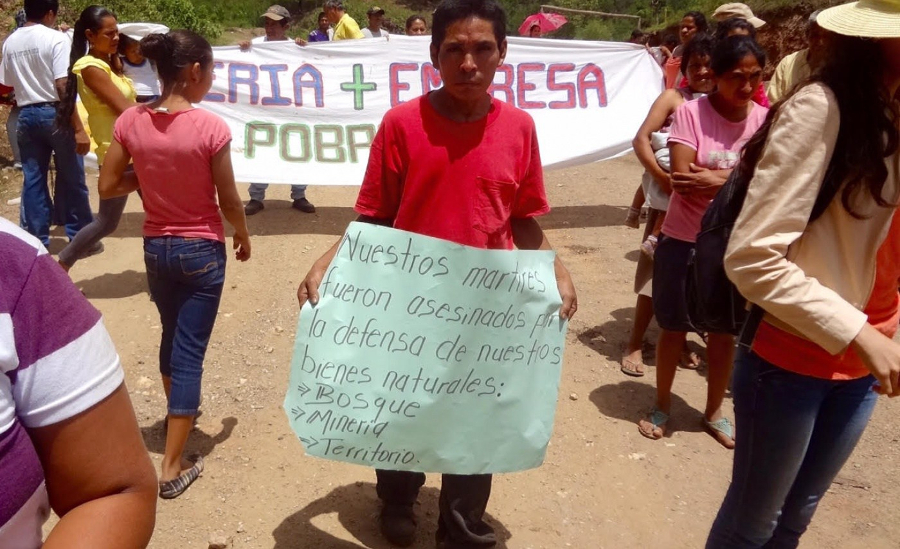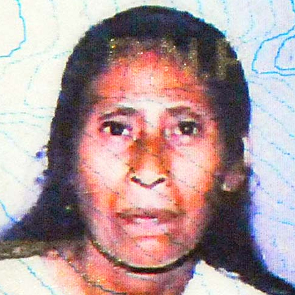Three years, no justice

Three years ago, on 25 August 2013, environmental and indigenous people’s rights defenders María Enriqueta Matute, Armando Fúnez Medina and Ricardo Soto were killed in the village of San Francisco de Locomapa (Yoro) in Honduras.
All three defenders belonged to tribes of the Tolupán indigenous people, who have faced centuries of discrimination and violence - from Spanish colonizers in the 1500s to mining companies in 2016. Before their assassination, María, Armando and Ricardo were peacefully protesting against a mining operation and the construction of a hydroelectric dam on their indigenous land. Their killing followed years of threats and attacks by sicarios, people hired by mining companies, loggers and landowners to intimidate the local community.
Since the murder of these three human rights defenders, the risks facing indigenous communities have deepened. Environmental and indigenous people’s rights defenders in Honduras keep being threatened, harassed, criminalised and killed. A 2015 Global Witness report ranked Honduras the deadliest country in the world for environmental activists. In 2016, Front Line Defenders has received weekly reports of assaults on indigenous and environmental rights defenders in the country.
On 21 February 2016, Nahún Alberto Morazán, Roberto Carlos Palencia, José Alvarenga, Elvin Joel Alvarenga and Santos Matute, all members of the Tolupán indigenous peoples, were assassinated in San Francisco de Locomapa. In 2013, Santos and 37 other members of his community were granted precautionary measures by the IACHR in an attempt to mitigate the threats, harassment and acts of violence they endured. But that didn’t stop his murder three years later.
According to the IACHR’s February 2016 report on the Situation of Human Rights in Honduras, 17 members of the Tolupán peoples were killed in 2015. None have been properly investigated.
The 2013 massacre
The local residents of San Francisco Campo began protesting in 2009, when local landowners seized the indigenous people’s land to begin an antimony mining operation and build a large hydroelectric dam. None of the large-scale development projects engaged in the required prior consultation with the local population.
In July 2012, the community sent an open letter to the Minister for Justice and the Secretary for Indigenous Affairs about a timber magnate in the area, whose forestry operations had resulted in death threats and arbitrary arrests of members of the community who voiced their opposition to the mining and forestry operations. The Minister never replied to their letter.
On 25 August 2013, María Enriqueta Matute of the San Francisco Campo community, Armando Fúnez Medina of the Las Brisas tribe, and Ricardo Soto Fúnez of the Cabeza de Vaca 1 tribe, were participating in a peaceful sit-in in San Francisco Campo, blocking the main road to Locomapa together with some 150 other Tolupán indigenous people.
The protesters refused to let any traffic through. Around 5pm, the group was approached by two men, Selvin Matute y Carlos Matute, who after a short exchange of words opened fire on the three human rights defenders. Armando Fúnez Medina and Ricardo Soto Fúnez died on the spot, while María Enriqueta Matute ran to her nearby home. The gunmen tracked her down and shot her. No investigation was opened and the killers have not been brought to justice.
In a press release published on the third anniversary of the 2013 massacre, the Honduran organisation Broad Movement for Dignity and Justice (MADJ) writes:
Why did the killers take their lives? Because the HRDs refused to be exploited and humiliated, they refused to see the natural resources of their territory being stolen without benefiting the local community. For these reasons they silenced their voices, for these reasons they annihilate their bodies
Three years later, the Tolupán indigenous people and the human rights defenders who protect their rights are still waiting for justice.

